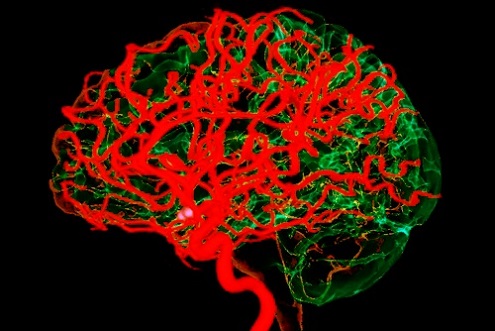Nikhil Prasad Fact checked by:Thailand Medical News Team Jan 10, 2025 3 months, 2 weeks, 2 days, 2 hours, 18 minutes ago
Medical News: Emerging research has identified critical links between cerebromicrovascular health and the persistent symptoms of long COVID. This condition, formally termed post-acute sequelae of SARS-CoV-2 infection (PASC), is characterized by a broad array of symptoms, including profound neurocognitive impairments such as "brain fog," fatigue, and memory difficulties. Affecting 10% to over 30% of those infected, long COVID poses a significant challenge for healthcare systems worldwide. Recent investigations into the cerebromicrovascular mechanisms underpinning these symptoms reveal complex pathways contributing to lasting brain health consequences.
 Cerebromicrovascular Health and Long COVID
Cerebromicrovascular Health and Long COVID
This
Medical News report delves into groundbreaking research conducted by scientists from institutions such as Semmelweis University in Hungary, the University of Debrecen-Hungary, and the University of Oklahoma-USA. By exploring how SARS-CoV-2 impacts the brain's microvasculature, this research aims to unravel the intricacies of long COVID and its long-term implications for cognitive health.
The Cerebromicrovascular Network and Its Role in Brain Function
The brain's intricate network of microvessels ensures the delivery of essential nutrients and oxygen to its cells. Extending over 600 kilometers, these capillaries play a pivotal role in maintaining cognitive health. However, disruptions in this system, often termed cerebromicrovascular dysfunction, are increasingly recognized as key contributors to the persistent symptoms of long COVID.
Long COVID's neurological manifestations arise from various factors. Among these are endothelial dysfunction, mitochondrial damage, and autoimmunity triggered by SARS-CoV-2. The virus's ability to infect endothelial cells lining these microvessels exacerbates inflammation, oxidative stress, and disruptions to the blood-brain barrier (BBB). These processes create a cascade of effects that impair neurovascular coupling - the critical mechanism by which blood flow adjusts to neuronal activity.
Key Findings from the Study
Recent research has highlighted several mechanisms through which SARS-CoV-2 disrupts cerebromicrovascular health:
-Endothelial Dysfunction: The virus's direct invasion of endothelial cells and subsequent downregulation of ACE2 receptors disrupts the renin-angiotensin system, leading to heightened inflammation and vasoconstriction.
-Mitochondrial Damage: SARS-CoV-2 induces mitochondrial dysfunction in endothelial cells, increasing oxidative stress and impairing cellular energy production.
-Blood-Brain Barrier Disruption: The inflammatory milieu caused by the infection compromises the BBB, allowing harmful substances and immune cells to penetrate the brain.
-Formation of Autoantibodies: Post-infection autoantibodies target various components of the brain and vasculat
ure, further aggravating neuroinflammation.
The cumulative impact of these factors includes reduced cerebral blood flow, increased vulnerability to neurodegeneration, and the potential acceleration of conditions such as Alzheimer’s disease. The study findings underscore the importance of addressing these pathophysiological processes to mitigate the long-term cognitive consequences of long COVID.
Age-Related Vulnerability and Long COVID
Age appears to amplify the risk and severity of cerebromicrovascular dysfunction in long COVID. Older adults, already predisposed to vascular aging and chronic inflammation, face heightened risks due to the synergistic effects of pre-existing conditions such as hypertension, diabetes, and cardiovascular disease. Research indicates that these age-related vulnerabilities exacerbate the endothelial damage, BBB disruption, and neurovascular uncoupling triggered by SARS-CoV-2.
Therapeutic and Diagnostic Advances
Advanced imaging techniques are proving invaluable for assessing cerebromicrovascular health in long COVID patients. Methods such as magnetic resonance imaging (MRI) and transcranial Doppler ultrasonography enable clinicians to detect microvascular abnormalities and blood flow disruptions. Additionally, biomarkers like exosomes hold promise for early detection and monitoring of vascular dysfunction.
Therapeutic interventions are also evolving. Anti-inflammatory agents, antioxidants, and endothelial protectants show potential in addressing cerebromicrovascular complications. Regular physical activity has emerged as a non-pharmacological strategy to enhance cerebrovascular health and reduce inflammation. Researchers are also exploring the role of immunomodulatory therapies to counteract the effects of autoantibodies and chronic inflammation.
Conclusions
The intricate relationship between cerebromicrovascular health and long COVID’s neurocognitive symptoms underscores the need for targeted interventions. This study provides compelling evidence that SARS-CoV-2’s effects on the brain’s microvascular system are central to the persistence of symptoms like brain fog and fatigue. Addressing endothelial dysfunction, BBB disruption, and mitochondrial damage is critical for improving outcomes in affected individuals.
As researchers continue to uncover the mechanisms behind these complications, future therapies may offer hope for mitigating long COVID’s impact on brain health. Efforts to enhance diagnostic tools and treatment strategies will undoubtedly pave the way for better management of this complex condition.
The study findings were published in the peer-reviewed journal: GeroScience.
https://link.springer.com/article/10.1007/s11357-024-01487-4
For the latest Long COVID News, keep on logging to Thailand
Medical News.
Read Also:
https://www.thailandmedical.news/news/russian-scientists-discover-that-covid-19-causes-biochemical-changes-in-the-brain-s-cingulate-gyrus
https://www.thailandmedical.news/news/folate-deficiency-aggravates-covid-19-impacts-on-brain-health
https://www.thailandmedical.news/news/sars-cov-2-membrane-protein-induces-hippocampal-atrophy-and-neurodegeneration
https://www.thailandmedical.news/news/french-scientists-find-that-sars-cov-2-can-replicate-and-persist-in-the-brainstem-for-lengthy-periods
https://www.thailandmedical.news/news/romanian-study-warns-that-covid-19-increases-risk-of-brain-bleeding
https://www.thailandmedical.news/news/hong-kong-doctors-warn-that-covid-19-vaccines-can-cause-severe-inflammation-of-the-brain-s-blood-vessels
https://www.thailandmedical.news/articles/coronavirus
https://www.thailandmedical.news/articles/long-covid
